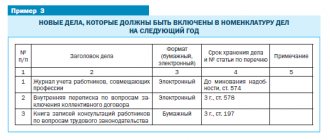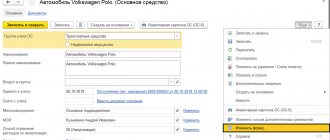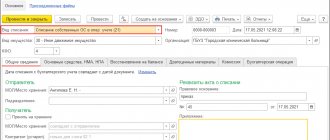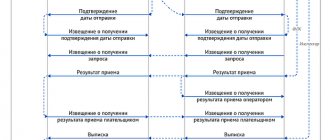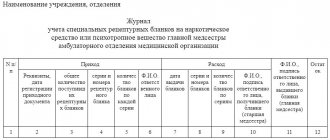How long to store documents
Article 23 of the Tax Code of the Russian Federation states that documents must be stored for 4 years, unless otherwise provided by the Code . This applies to those papers that are needed to calculate and pay taxes. Thus, 4 years is the shortest period for storing documents related to accounting and tax accounting.
Moreover, it is important to understand how this period is calculated. At first glance, it seems that the four-year period begins to run from the date the document is drawn up, but this is not so. The Ministry of Finance in its letter dated July 19, 2017 No. 03-07-11/45829 explains that the document storage period begins from the end of the tax period in which this document was used to calculate or pay taxes. And if we are talking about documents on fixed assets subject to depreciation, then the shelf life begins after the end of depreciation. This explanation is contained in the letter of the Ministry of Finance of the Russian Federation dated February 12, 2016 No. 03-03-06/1/7604.
In addition, the storage periods for accounting documents are discussed in Law 402-FZ, namely in Article 29.
What deadlines are established by this law for certain documents can be seen from the table.
Table. Minimum storage period for accounting documents
| At least 5 years after the end of the reporting year | At least 5 years after the year of last use for financial reporting purposes |
|
|
|
|
|
|
|
Different deadlines for one document
In practice, it often happens that a document needs to be stored for different periods of time. Let's take primary documents as an example. From the point of view of Article 23 of the Tax Code of the Russian Federation, they must be stored for at least four years. However, Article 29 of Law 402-FZ requires that they be stored for at least 5 years (see table above). It is clear that in this case you need to focus on a longer period. That is, you need to store the “primary” document for at least 5 years after the end of the reporting year.
Important! If questions arise regarding the storage of a document of a certain type, the exact storage period can be found in the order of the Ministry of Culture of the Russian Federation dated August 25, 2010 No. 558.
GLAVBUKH-INFO
What documents must be kept?Legislation obliges the organization to take measures to store documents that are generated in its activities (Clause 1, Article 17 of the Law of October 22, 2004 No. 125-FZ). The laws on joint stock companies and LLCs provide a list of documents that must be stored (Article 89 of the Law of December 26, 1995 No. 208-FZ, Article 50 of the Law of February 8, 1998 No. 14-FZ). These, in particular, include the organization’s accounting documents: primary documents, accounting registers and financial statements. In addition, the organization’s obligation to store accounting documents is provided for in Article 17 of Law No. 129-FZ of November 21, 1996.
LLCs are required to include provisions on the procedure for storing documents in their charters (clause 2 of article 12 of the Law of February 8, 1998 No. 14-FZ).
Joint-stock companies store documents for the period of time established by the resolution of the Federal Commission for the Securities Market of Russia dated July 16, 2003 No. 03-33/ps, which is applied taking into account the order of the Ministry of Culture of Russia dated August 25, 2010 No. 558.
Storage rules can be prescribed in the internal documents of the organization, for example in the Archive Regulations.
Shelf life
Situation: for how long is the organization required to store accounting documents?
The legislation does not contain a clear answer to this question.
Article 23 of the Tax Code of the Russian Federation states that the organization must store documents necessary for the purpose of calculating taxes (including accounting documents) for four years (subclause 8, clause 1, article 23 of the Tax Code of the Russian Federation). This requirement applies to all accounting and tax documents necessary for the calculation and payment of taxes, including documents from electronic document management systems between the bank and clients (in particular, client-bank systems). The organization is obliged to comply with the specified deadline, unless other deadlines are established by law. Similar conclusions are confirmed by letter of the Ministry of Finance of Russia dated March 30, 2012 No. 03-11-11/104.
At the same time, Article 17 of Law No. 129-FZ of November 21, 1996 states that primary accounting documents, accounting registers and financial statements must be stored for the period established by the rules of archiving, but not less than five years. The storage periods for standard archival documents are determined in the list approved by order of the Ministry of Culture of Russia dated August 25, 2010 No. 558.
Thus, to avoid liability for failure to comply with the rules established by Law No. 129-FZ of November 21, 1996, store documents for at least five years. And those for which a longer storage period is established - for the period established by law.
A special storage procedure is established for documents confirming a loss incurred for tax accounting purposes (for example, primary documents, tax accounting registers). Keep them for the entire period in which the loss will reduce the income tax base. This follows from paragraph 4 of Article 283 of the Tax Code of the Russian Federation. After the entire amount of the loss has been repaid, keep the documents confirming its formation for another four years (subparagraph 8, paragraph 1, article 23 of the Tax Code of the Russian Federation, letter of the Ministry of Finance of Russia dated April 26, 2011 No. 03-03-06/ 1/270).
Keep copies of used strict reporting forms (stubs) confirming the amounts of cash received, packed in sealed bags, for at least five years. At the end of this period, but not earlier than a month from the date of the last inventory, copies of used forms are destroyed on the basis of the act of their write-off. Such rules are established in paragraph 19 of the Regulations, approved by Decree of the Government of the Russian Federation of May 6, 2008 No. 359.
Consider the beginning of the storage period for documents to be January 1 of the year following the year in which they were compiled (accepted for accounting) (paragraph 4 of clause 1.4 of the list approved by order of the Ministry of Culture of Russia dated August 25, 2010 No. 558).
The exceptions are:
- purchase book and sales book - determine the beginning of the storage period from the date of the last entry in them (clause 24 of section II of appendix 4 and clause 22 of section II of appendix 5 to the Decree of the Government of the Russian Federation of December 26, 2011 No. 1137);
- documents confirming the original cost of the depreciable property - start counting the period from the moment when the accrual of depreciation stopped (letter of the Ministry of Finance of Russia dated April 26, 2011 No. 03-03-06/1/270).
Storage
To store accounting documents, the organization must equip special rooms, safes or cabinets (clause 6.2 of the Regulations, approved by letter of the USSR Ministry of Finance dated July 29, 1983 No. 105). Recommendations for the arrangement of such storage facilities are given in the Rules approved by the decision of the Rosarkhiv board of February 6, 2002. However, it is not necessary to comply with all the requirements given in this document (paragraphs 3 and 6 of the introduction to the Rules, approved by the decision of the Rosarkhiv board of February 6, 2002. ).
Store strict reporting forms in safes, metal cabinets or special rooms to ensure their safety (clause 16 of the Regulations approved by Decree of the Government of the Russian Federation of May 6, 2008 No. 359). Collect cash orders, advance reports, bank statements with related documents in chronological order and bind them.
Store documents labeled “trade secret” in safes.
Store other documents in special rooms or locked cabinets under the responsibility of persons authorized by the chief accountant.
This procedure follows from paragraphs 6.2–6.4 of the Regulations approved by letter of the USSR Ministry of Finance dated July 29, 1983 No. 105 and paragraphs 3.2 and 3.6 of the Regulations approved by Resolution of the Federal Securities Commission of Russia dated July 16, 2003 No. 03-33/ps.
Invoices, as they are issued and received, are recorded in the accounting journal in chronological order (clause 3 of section II of appendix 3 to Decree of the Government of the Russian Federation of December 26, 2011 No. 1137). Accounting logs are stored for at least four years from the date of the last entry in them (clause 13 of section II of Appendix 3 to the Decree of the Government of the Russian Federation of December 26, 2011 No. 1137).
Situation: is it possible to store documents electronically?
Yes, you can.
According to the legislation on accounting, primary and consolidated accounting documents can be compiled on paper and computer media (clause 7, article 9 of the Law of November 21, 1996 No. 129-FZ). Tax legislation also provides for the possibility of maintaining tax accounting registers on paper, in electronic form and (or) any computer media (Article 314 of the Tax Code of the Russian Federation). Tax returns (calculations) can also be submitted in established forms on paper or in established formats in electronic form (Article 80 of the Tax Code of the Russian Federation).
Thus, it is possible to store primary documents, accounting and tax documents prepared by an organization, and tax returns (calculations) in electronic form. The only condition is that such documents must be certified in the proper manner, that is, by means of an electronic signature.
Similar conclusions follow from letters of the Ministry of Finance of Russia dated August 22, 2012 No. 03-02-07/1-202 and dated July 24, 2008 No. 03-02-07/1-314.
For other participants in business transactions, as well as at the request of regulatory agencies, it is necessary to make copies of electronic documents on paper (certified with a handwritten signature). For example, for the organization’s counterparties they will serve as confirmation of expenses incurred, and for the tax inspectorate - the subject of tax control (clause 1 of article 252, clause 1 of article 93 of the Tax Code of the Russian Federation). This conclusion is based on the provisions of paragraphs 1 and 7 of Article 9 of the Law of November 21, 1996 No. 129-FZ, Articles 313 and 314 of the Tax Code of the Russian Federation.
Situation: where the organization should store the branch’s accounting documents - in the division or head office of the organization
The answer to this question depends on the legal form of the organization.
In joint-stock companies, all accounting documents must be stored both in the head office of the organization and in the branch before transferring them to the archive (clause 3.1 of the Regulations approved by Resolution of the Federal Commission for the Securities Market of Russia dated July 16, 2003 No. 03-33/ps). The legislation does not contain a requirement that an archive in a joint-stock company should be created at the location of the organization’s head office (Regulations approved by Resolution of the Federal Commission for the Securities Market of Russia dated July 16, 2003 No. 03-33/ps). This means that documents in any case can be stored both at the head office of the organization and at the branch.
In an LLC, documents must be stored at the location of the head of the organization or in another place known to the participants of the organization (Clause 2 of Article 50, Article 40 of the Law of February 8, 1998 No. 14-FZ). This means that the documents of the branch can be stored both in the branch itself (since its existence is known to the participants of the company) and in the head office of the organization (clause 2 of article 50, article 5 of the Law of February 8, 1998 No. 14- Federal Law).
Situation: should the successor organization keep documents of the reorganized organization
Yes, I should.
During the reorganization of the successor organization, all property and obligations of the reorganized organization are transferred to it (Articles 58, 59 of the Civil Code of the Russian Federation). In this case, the successor organization at the time of state registration of the new organization draws up introductory accounting statements, which are filled out on the basis of the transfer deed or separation balance sheet, as well as data from the final accounting statements of the reorganized organization. This procedure follows from paragraph 13 of the Methodological Instructions, approved by Order of the Ministry of Finance of Russia dated May 20, 2003 No. 44n.
Article 17 of Law No. 129-FZ of November 21, 1996 states that all primary documents, accounting registers and financial statements must be stored for at least five years.
This means that the successor organization must store the documents of the reorganized organization in a general manner. The Russian Ministry of Finance expresses the same opinion in letter dated September 7, 2005 No. 03-11-04/2/70.
Transfer of documents to the archive
To create conditions for storing accounting documents, an organization can create an archive (clause 2 of article 13 of the Law of October 22, 2004 No. 125-FZ). Depending on the volume of documents, create an archive as an independent structural unit of the organization or a unit as part of the records management service (office, secretariat) (clause 1.1.2 of the Rules, approved by the decision of the Rosarkhiv board of February 6, 2002).
Transfer documents of permanent and temporary (over 10 years) storage to the archive. Keep the remaining documents (storage period less than 10 years) in the accounting department until they are destroyed. This procedure is recommended in paragraphs 3.3.1 and 3.3.2 of the Rules, approved by the decision of the Rosarkhiv board of February 6, 2002.
To transfer accounting documents to the archive, you need to create files. Before submitting for archival storage, the case must be finalized, namely:
- draw up an internal inventory;
- draw up a certification sheet;
- hem (bind) the case;
- number the case sheets;
- design the cover of the case.
This procedure is provided for in paragraph 3.4.2 of the State Budgetary Educational Institution, approved by order of the Main Archive of the USSR dated May 25, 1988 No. 33.
Situation: can an organization transfer to the archive accounting documents whose storage period does not exceed 10 years
Yes maybe.
The procedure for transferring documents to the organization's archive is defined in paragraphs 3.3.1 and 3.3.2 of the Rules, approved by the decision of the Rosarkhiv board of February 6, 2002. Thus, only documents of permanent and temporary (over 10 years) storage are transferred to the archive.
However, a commercial organization is not obliged to comply with these requirements (paragraphs 3 and 6 of the introduction to the Rules, approved by the decision of the Rosarkhiv board of February 6, 2002). Therefore, accounting documents whose storage period does not exceed 10 years can also be transferred to the organization’s archive. Provide for such a procedure, for example, in the Archive Regulations.
Situation: is it possible to archive electronic documents?
Yes, you can (clause 1.2.2 of the Rules, approved by the decision of the Rosarkhiv board of February 6, 2002).
The procedure for submitting electronic documents to the archive was recommended by the decision of the Rosarkhiv board of February 6, 2002.
Electronic documents of an organization are archived only after they are no longer used in operational work. The organization creates an expert commission that selects electronic documents on electronic media. When selecting electronic documents that are transferred for archival storage, the expert commission is guided by the following criteria:
- significance, completeness (completeness) of documents;
- authenticity (completeness and reliability) of documents;
- no duplication of information in documents.
This is stated in paragraph 2.1.4 of the Rules, approved by the decision of the Rosarkhiv board of February 6, 2002.
Also, all operations carried out with electronic documents when transferred to archival storage and during storage (rewriting, converting to new formats, compression, etc.) must be documented to ensure the authenticity of the documents. This follows from paragraph 1.3.4 of the Rules, approved by the decision of the Rosarkhiv board of February 6, 2002.
Accounting
In accounting, reflect the organization’s expenses for the formation of cases on account 26 “General business expenses” or 44 “Sales expenses” (Instructions for the chart of accounts).
If work on the formation of cases is carried out under a civil contract, then reflect the accrued remuneration by posting:
Debit 26 (44) Credit 76 – remuneration was accrued under a civil contract for work performed on the formation of cases.
If work on the formation of cases is performed by an employee of the organization within the framework of an employment contract, then reflect the accrued remuneration by posting:
Debit 26 (44) Credit 70 – the salary of the employee involved in the formation of cases was accrued.
Taxation of these payments is carried out in the same way as for all other employment contracts.
Attention: the absence (violation of the procedure and storage periods) of accounting documents is an offense (Article 106 of the Tax Code of the Russian Federation, Article 2.1 of the Code of Administrative Offenses of the Russian Federation), for which tax and administrative liability is provided.
The absence of accounting documents (for example, due to their loss) is recognized as a gross violation of the rules for keeping records of income and expenses. There is tax liability for it.
In addition, for failure to comply with the procedure and terms for storing accounting documents, at the request of the tax inspectorate, the court may impose administrative liability on officials of the organization (for example, its head) in the form of a fine in the amount of 2,000 to 3,000 rubles. (Part 1 of Article 23.1, Article 15.11 of the Code of Administrative Offenses of the Russian Federation).
In each specific case, the perpetrator of the offense is identified individually. In this case, the courts proceed from the fact that the manager is responsible for organizing accounting, and the chief accountant is responsible for its correct maintenance and timely preparation of reports (clause 24 of the resolution of the Plenum of the Supreme Court of the Russian Federation of October 24, 2006 No. 18). Therefore, the subject of such an offense is usually recognized as the chief accountant (an accountant with the rights of the chief). The head of an organization may be found guilty of:
- if the organization did not have a chief accountant at all (resolution of the Supreme Court of the Russian Federation dated June 9, 2005 No. 77-ad06-2);
- if accounting and tax calculation were transferred to a specialized organization (clause 26 of the resolution of the Plenum of the Supreme Court of the Russian Federation of October 24, 2006 No. 18);
if the reason for the violation was a written order from the manager, with which the chief accountant did not agree (clause 25 of the resolution of the Plenum of the Supreme Court of the Russian Federation of October 24, 2006 No. 18).
| Next > |
How to store documents
Storage rules are not regulated by law; companies and entrepreneurs must develop them themselves. If we are talking about a small volume of documents, then a safe in the director’s office or in the accounting department.
It is also possible to store documents in electronic form. This is stated, for example, in the letter of the Ministry of Finance dated July 24, 2008 No. 03-02-07/1-314. Such documents must be certified with a digital signature.
What to do if the number of documents exceeds the capacity of the safe? an archive room for storage . As a rule, documents that need to be stored permanently or for more than 10 years, as well as personnel documents, are stored there. It is advisable to keep papers that are subject to storage for a shorter period of time in a safe and destroy them in a timely manner.
The archive must be equipped in accordance with the rules approved by the Decision of the Board of the Federal Archive of 02/06/2002 (hereinafter referred to as the rules of the Federal Archive). Therefore, the first room you come across in the office will not work. So, the correct archive room:
- is isolated;
- is safe in terms of fire and flooding;
- has an emergency exit;
- does not have a pipeline (gas, water);
- is not damp, unheated, dilapidated, or by any criteria does not meet sanitary and hygienic standards;
- not intended for storing food products, for catering services, etc.;
- has natural or artificial ventilation (if it is a pantry without windows).
If there is no suitable premises, you can enter into an agreement with a third-party organization that provides document storage services.
Login to the site
Issue 1 12/09/2010The beginning of the beginning - neatly signed daddies
I repeat once again - my newsletter is for beginners taking their FIRST steps in accounting. AND
I teach the way I work myself, the way I’m used to. I feel so comfortable. As shown
practice, my method of accounting, office work, documentation storage
also suits tax inspectors - numerous audits have proven this.
So - for some reason you needed knowledge of accounting. I warn you right away - it’s better
All you have to do is learn from an existing enterprise.
In addition, I also want to clarify what I call “accounting”. And not just me. Our
unfortunate accountants are so loaded with senile accounting rules
tax and accounting, that there is enough strength almost only for TAX
ACCOUNTING. Because this is what is tested and what is punished for.
So let's get started.
Carefully collect all the documents that you have accumulated and begin
systematize. Without this, accounting is impossible. Each document must
know your place. By the way, it will also be convenient for you - using this system you will immediately
find the document you need. Your actions in order:
1. Create folders so that documents do not lie on your table and under the table
(so as not to stagger), but were laid out in an organized manner in specially labeled folders.
I will now give you the names of the folders, account numbers according to the Chart of Accounts
Ukraine and the names of documents that should be in these folders. Folders
choose according to your taste - take at least a binder for 3 kopecks, the only thing
condition - the folder must contain what I listed above, and documents from
folders should not fall out. It's a bit tiring to crawl on the floor and collect
colorful leaves. If you take a binder, it’s better to put it in it
transparent files. Each individual file in the folder is a separate month.
I also want to say about account numbers - even if this is not interesting to you, for tax purposes
During inspections, any inspector will look at your daddies approvingly. In addition, you
Slowly begin to memorize account numbers. It will come in handy.
Folder names (write the name of the company at the top, or the full name of the private
entrepreneur - this will help you figure it out if you have several companies, as well as
find your folders after checking with the tax office):
Settlements with customers Account 361 invoices, invoices for the release of goods, acts of acceptance of work, services (in this folder we put what was given to customers - we issue an invoice for the issue of goods, the provision of services - with an act of acceptance and transfer of work, services);
Settlements with suppliers Account 631 invoices, invoices for the receipt of goods, acts of transfer of work, services (in this folder we put what we received from suppliers of goods, work or services; for the supply of goods you are required to issue a receipt invoice; for the provision of work, services - an act acceptance and transfer of works, services);
Settlements with accountable persons Account 3721 advance reports, invoices, copies of checks, receipts, certificates of work performed, services,
(in this folder we put the documents that were given to you when purchasing for cash - you either report to the company for the money given to you for business expenses, or you become a creditor of the company)
Payroll sheets Account 661 (in the next issues I will post a salary sheet in Excel format, a separate issue will be all about salaries and payroll accruals);
Tax invoices received by Tax Code (tax credit), tax invoices, register of tax invoices
Tax invoices issued by NO (tax obligations) tax invoices, register of tax invoices
Current account Account 311 bank statements, payment orders (collect here everything that was given to you by the bank at the end of the month, here you can also add a log of payment orders - from your side);
Cash register Account 301 cash book, cash receipts and expenditure orders, salary payment statements (I will devote a separate issue of the newsletter to maintaining the cash book and processing cash orders).
Correspondence log of letters, incoming and outgoing letters
Business agreements; journal of registration of agreements, agreements for the supply of goods, works, services
Personnel documents: personal sheets for personnel records, work books, agreements on financial responsibility, photocopies of passports, diplomas and tax numbers (a simplified version of maintaining personnel records will be given in the following issues);
Copies of constituent documents (photocopies of the most common documents on enterprise registration -
photocopies of passports, identification numbers of founders, directors, accountants,
certificates of state registration of the enterprise, certificates from the regional statistics, certificates of
VAT payer registration, certificate of registration as a single payer
tax, certificate of registration with the tax office, notification of registration in
funds (pension, employment, social insurance, injury).
For current documents, you dump here everything that for some reason you couldn’t sort, but in general this is a folder for throwing into it everything that comes into your hands during the month (I’m talking about the documents of the current month).
2. Assignment for home - label folders, sort documents, if something is unclear - write to me.
3. By the way - before December 15, 2010, it is advisable for you to pay the utility tax (3 UAH. 40 kopecks per person in Dnepropetrovsk),
before 12/20/2010 - pay a contribution to the Pension Fund (33.2%, 4% (for disabled people) and 2% of accrued salary),
until December 20, 2010 - pay a single tax (if you are a sole proprietor or a simplified enterprise (for now),
before December 20, 2010 - submit a VAT return (if you are a VAT payer),
before December 20, 2010 - submit a report to the Pension Fund (if you registered in November 2010,
until December 30, 2010 - pay income tax on accrued wages and, if desired,
contributions to other funds (employment, social insurance, injuries).
VERY DESIRABLE
pay dues for December, because from January 1, 2011, the Cabinet of Ministers prepared for us
another... that is, surprise (no, even so - SURPRISE!) - a single social contribution! We can’t wait, but in the meantime, the girls in the funds are asking that contributions for December be paid by December 31, 2010, so that there are no “tails” and debt left.
In the meantime, I say goodbye to you. Take heart.
When the shelf life has expired
In accordance with the above-mentioned rules of the Federal Archive, it is necessary to conduct an annual examination of the value of documents . As a result, those papers are selected that are no longer necessary to be stored. They should be destroyed.
The examination of documents has another purpose - to check the lists of documents to be stored and the relevance of the deadlines. The examination is carried out by personnel department employees, the head of the organization is responsible for it. When checking documents for expiration, it is unacceptable to simply look at their title pages and headings - each of them needs to be flipped through.
Based on the results of the examination, a Certificate of allocation for destruction of documents not subject to storage is left. Its form is defined in Appendix No. 4 to the rules of the Russian Archive. Documents are included in the act under a general heading, indicating their number in each group. The act is signed by the head of the company.
Now all expired papers should be destroyed. How exactly to do this? This issue is not regulated, so the company can resolve it independently. Documents can be shredded, recycled, burned - any method will do. Alternatively, you can send the papers for recycling to a specialized organization. Their transfer is accompanied by the execution of an invoice, in which you need to indicate the date, number of documents and their weight. The employee responsible for their safety must monitor the removal of papers subject to destruction.
If the company closes
In accordance with paragraph 10 of Article 23 of Law 125-FZ on archival affairs, documents of a liquidated organization must be submitted to the state or municipal archive . The reorganized company transfers its documents to the legal successor. The following documents should be submitted:
- related to the personnel of the organization;
- having the status of belonging to the Archival Fund of the Russian Federation (established based on the results of an examination of the value of documents);
- with an unexpired shelf life.
Documents are transferred for storage to the archive under an agreement. The liquidation commission transfers the securities of the liquidated company. If the company goes bankrupt, then the bankruptcy trustee must transfer the documents to the archive.
Before submitting documents for storage, they need to be grouped by type, storage period and distributed in chronological order. Prepared documents are numbered, stitched, collected in bundles or placed in boxes, sealed and transferred to the archive.
